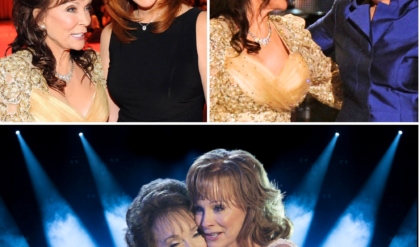Actor Nicola Coughlan doesn’t want to be called ‘brave’ for steamy scenes

Nicola Coughlan attends the Toronto premiere of Netflix’s Bridgerton Season 3 Part 2 at the Elgin and Winter Garden Theatre Centre on June 3 in Toronto. Coughlan plays Penelope Featherington, who got a promotion this season from introverted observer to sexy leading lady. (Robert Okine/Getty Images)
Nicola Coughlan says it’s tough having perfect breasts.
The actress who plays Penelope Featherington in Season 3 of Netflix’s hit series Bridgerton admitted as much during a Q&A in Dublin last week. A male member of the audience had just told Coughlan he thought she was “very brave for this role.”
In the second half of the season, which comes out Thursday, Coughlan, like other female leads, will appear in compromising sex scenes. But unlike the leads in Seasons 1 and 2 of the racy drama set in Regency-era London, Coughlan has been the target of comments and criticisms about her curvier body.
And the audience member’s comment was just one example in an industry where women’s bodies are still freely discussed, criticized and shamed.
“You know, it is hard, because I think women with my body type — women with perfect breasts — we don’t get to see ourselves on screen enough,” Coughlan said as the audience cheered.
“I’m very proud as a member of the perfect breasts community,” she added. “I hope you enjoy seeing them.”
There’s been a lot of buzz about the third season of Netflix’s steamy period piece as fan-favourite character Penelope gets promoted from introverted observer to female lead. That move has been applauded by fans and critics alike for its body positivity, not just in terms of representation of larger body types, but for showing Penelope as romantic, desirable and sexy.
In a media landscape where celebrities and characters are still often fat-shamed, and larger female characters are frequently used for comic relief, many people online have said they find Coughlan’s portrayal in Bridgerton validating.
In a TikTok video with 6.6 million views, Ishioma Odinjor jokes about “feeling seen” after watching a sizzling carriage scene. In another video with seven million views, a TikTok user with the handle Lady Kendra Bee thanks the show for portraying larger characters gracefully and respectfully.
Diversifying the way a female lead can look is a powerful form of representation for those who don’t look like a Hollywood starlet, which is most people, said Shauna Pomerantz, a professor of child and youth studies at Brock University in St. Catharines, Ont., who studies media, youth and pop culture.
“Penelope Featherington shows that all women can be sexy and deserving of love, but also that all women can be sexual,” Pomerantz told CBC News.
There’s been an ideal of thinness portrayed in the media since about the 1960s that women have felt they need to attain, and not just to be beautiful, but to be valued, said Amanda Ravary, an assistant professor of psychology at Bishop’s University in Sherbrooke, Que., who studies weight stigma.
“To actually see somebody who does not fit this very restrictive and unattainable thin ideal body being actually portrayed in a positive light is just incredibly refreshing.”

Luke Newton. left, as Colin Bridgerton, left, and Coughlan as Penelope Featherington. The second part of the season promises to be steamy. (Liam Daniel/Netflix)
The ‘funny fat girl’ trope
But Pomerantz also says she doesn’t see a wider, linear shift in the media landscape — not when most lead actresses still look a certain way, and when there’s so much backlash when someone who looks different is cast in a major role.
“In spite of efforts to reduce ‘fat shaming’ and diversify Hollywood … the trope around the sexy, skinny female lead who deserves — and gets — love remains fairly consistent.”
The ideal body type in Hollywood is still overwhelmingly one that is thin, according to a 2022 report by The Representation Project, a U.S. advocacy group that seeks to end stereotypes in the media. That report found only 6.7 per cent of characters in the past decade’s most popular films were fat, and none of them were in lead roles. (The report’s authors note that they use the word fat “because it’s not an insult.”)
The numbers were similar in television, where only 6.6 per cent of female leads were fat, and, as in film, were more likely to be portrayed as funny or “stupid.”
“Fat women characters are rarely portrayed as romantic interests and are frequently treated as ‘sexually unappealing.’ They are often depicted as ‘sidekicks,’ and are used as ‘props against which thinner women are compared, judged and valued,'” the report noted.
The “funny fat girl” trope is used often in popular movies and shows, where actors like Melissa McCarthy and Rebel Wilson were often the target of jokes. “Fat Monica” on the iconic 1990s show Friends is another memorable example, where slender actor Courtney Cox would don a fat suit for laughs.

Matthew Perry, left, and Courtney Cox are seen in an episode of Friends where Cox dons a fat suit. In the show, ‘fat Monica’ is seen as less confident, more childish and is often the butt of jokes. (NBC/Online USA Inc/Getty Images)
Larger characters can also be saddled with plotlines that centre around their size, like Chrissy Metz’s struggle with her weight on This is Us. Or they lose weight and then become desirable, another common trope used, for example, in the 2018 series Insatiable.
Spoilers for Part 1 of Season 3 below:
That’s one trope London-based culture and film critic Leila Latif said she’s grateful Bridgerton didn’t fall back on, even though, in the books that inspired the series, the Penelope character loses “two stone,” or about 28 pounds, before Colin Bridgerton notices her.
In the Netflix series, although she does get a makeover that involves form-fitting dresses, along with sleeker hairstyles and makeup, Penelope’s size stays the same.
“It’s about her confidence, it’s about the fact that she actually believes, over the course of the series, actually discovers that being herself is a very compelling person,” Latif told CBC Commotion in May.
Comments ‘disappointing and reductive’
While there has been more of a shift recently with curvier lead characters, there’s also been viewer backlash. Actress Reneé Rapp was criticized for her body in the recent remaking of Mean Girls, Amy Schumer was accused of having a “puffy face” while promoting Season 2 of Life and Beth.
Last month, Irish singer and songwriter CMAT posted on X that “the BBC had to turn comments off a video of me performing at big weekend because so many people were calling me fat in the comments.”
Coughlan, who shot to global fame playing Clare in the series Derry Girls, has previously asked people not to comment on her body, and to focus on her acting.
But when the first part of Bridgerton Season 3 was released, Coughlan was criticized on both social media (where it was also debated whether she’s really plus-sized) and traditional media, where it got ugly in at least one notable example.
A columnist for the U.K.’s The Spectator wrote on May 24 that “a zest for equality and diversity (and in this case good acting) just isn’t enough to make a fat girl who wins the prince remotely plausible.”
“She’s not shapely — which can work as sexy even in Hollywood; she’s fat.”

Coughlan attends Netflix’s Bridgerton Season 3 world premiere in New York City on May 13. A columnist wrote that it wasn’t plausible that a woman who looks like her ‘wins the prince.’ (Dimitrios Kambouris/Getty Images for Netflix)
That article was widely lambasted, but the comments about her body have continued. Coughlan has called the discourse “disappointing and reductive.”
“It’s insulting because I worked hard on this show; a year of fittings and dance lessons and shooting, I barely saw my family, I gave it my absolute all. And then I start doing press and all people want to talk about is my body?” she told Stylist.
‘Amazingly empowering’
The second half of Season 3, like previous seasons, promises to be steamy.
Coughlan herself ensured it, according to Stylist magazine, as she pushed to appear nude.
“There’s one scene where I’m very naked on camera, and that was my idea, my choice,” she told the magazine.
“It was amazingly empowering.”
Lena Dunham, who wrote and starred in HBO’s Girls (2012-2017), had a similar response to the scathing criticisms about showcasing her naked body in the series, Pomerantz noted — she would just appear naked more often.
This kind of celebrity clap-back to weight-shaming messages has a positive effect on implicit weight bias in women, Ravary said. And Coughlan’s comment about her “perfect breasts” in response to being called brave fits perfectly into that category, she added.
What Pomerantz said she’d like to see is more of a middle ground, where a curvy female lead isn’t hyper-sexualized by, say, having larger breasts, but is “larger, sexual, normalized, and also taken seriously.”
Still, she said, “Penelope Featherington comes pretty close to checking these boxes.”





